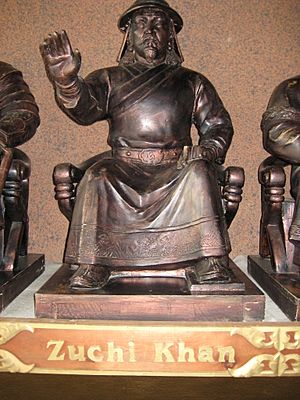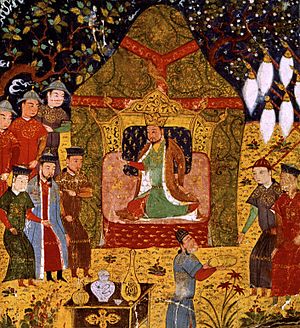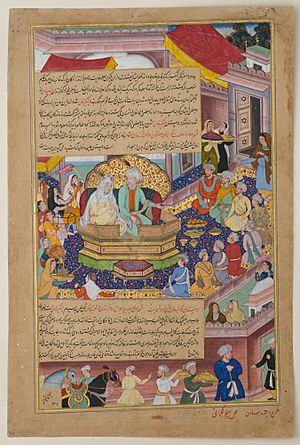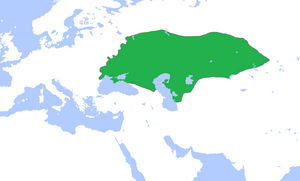Jochi facts for kids
Quick facts for kids Jochi |
|
|---|---|

Statue of Jochi Khan in Mongolia
|
|
| Khan of the Ulus of Jochi | |
| Predecessor | none |
| Successor | Orda (c. 1206–1280) Batu (c. 1207–1255) Berke, Khan of the Golden Horde from 1257–1267 |
| Born | 1182 Khamag Mongol |
| Died | 1227 (aged 44–45) Cumania, Mongol Empire |
| Burial | Zhezkazgan, Kazakhstan |
| Spouse | Sarkan Khatun Bekutemish Khatun Ukin Kuchin Khatun Sultan Khatun |
| House | Borjigin |
| Dynasty | Ulus of Jochi |
| Father | Genghis Khan |
| Mother | Börte |
| Religion | Tengrism |
Jochi (born around 1182 – died February 1227) was a skilled Mongol army leader. He was the oldest son of Genghis Khan, the famous founder of the Mongol Empire. Jochi was likely one of the four sons born to Genghis Khan's main wife, Börte. However, some people wondered about his true father throughout his life. Jochi was a great military commander and helped his father conquer many lands in Central Asia, fighting alongside his brothers and uncles.
Contents
Jochi's Early Life

There was some discussion about who Jochi's real father was. Shortly after his mother, Börte, married Temüjin (Genghis Khan's original name), she was captured by a group called the Mergid confederation. She was held captive for a few months before Temüjin rescued her. Soon after she returned, Jochi was born.
Even with these questions, Genghis Khan always treated Jochi as his first son. However, some doubt remained about whether Temüjin or another man was his biological father. Even though Jochi's family branch was the oldest among Genghis Khan's descendants, they were not chosen to lead the entire Mongol Empire after Genghis Khan died. There were also signs that Jochi and Genghis Khan sometimes had disagreements.
Jochi's Military Campaigns

In 1207, Jochi led his army to conquer several groups of "forest peoples" in Siberia. This expanded the northern border of the Mongol Empire for the first time. He also led two campaigns against the Kyrgyz in 1210 and 1218, on behalf of his father.
Jochi played a very important part in the Khwarezm war between 1219 and 1221. This war took place in Central Asia. Jochi's forces captured several towns like Signak, Jand, and Yanikant in April 1220.
Later, he was put in charge of attacking the city of Urgench (which is in modern-day Turkmenistan). This city was the capital of the Khwarezmian Empire. Jochi tried to get the city to surrender peacefully. He wanted to save it from being destroyed.
However, Jochi's brother, Chagatai, thought this was a bad military idea. Chagatai wanted to destroy the city, but Genghis Khan had promised the city to Jochi if he won. This disagreement about how to fight deepened the tension between Jochi and Chagatai. Genghis Khan had to step in and appointed his third son, Ögedei, to take over the command. Ögedei quickly captured, looted, and completely destroyed the city in 1221, killing many of its people.
The disagreements between Jochi and Chagatai also led to a personal argument about who would become the next leader of the empire. To solve this, Genghis Khan called a "kurultai". This was a special political and military meeting used for family matters and important state decisions. Genghis Khan had often used these meetings to get support for his wars.
According to tribal traditions, Jochi, as the first-born son, was expected to rule the clan and the empire after his father. But at the family kurultai in 1222, Chagatai brought up the question of Jochi's true father. At this meeting, Genghis Khan made it clear that Jochi was his rightful first-born son. However, he worried that the constant fighting between Jochi and Chagatai would split the empire apart.
So, by early 1223, Genghis Khan chose Ögedei, his third son, to be his successor. Both Jochi and Chagatai agreed to this decision to keep the empire united. But their disagreements never fully went away. This rift later caused the European part of the Mongol Empire to become separate from its Asian part.
Jochi's Legacy
Jochi's son, Berke, was one of the first Mongols to become a follower of Islam. Other important descendants of Jochi include Öz Beg Khan, Tokhtamysh, and Hacı I Giray.
Under Jochi's son, Batu, the Mongol rule expanded very far to the west. He established the Golden Horde (also known as the Kipchak Khanate). This group helped to strengthen the Jochid ulus, which was the territory given to Jochi's family. Later, Öz Beg Khan led the Golden Horde during a time of great economic, military, and political success. He also helped Islam become the main religion of the Horde.
The first mention of Jochi's burial place was in a 16th-century book called Sharaf-name-yi shahi. It described a campaign in 1582, saying:
On Saturday, 6th month, (khan) stopped near (Navaqi) Sarai in front of the mazar of Jochi khan.
Jochi's Family
Like his father, Jochi had many wives and partners. However, we don't know many exact details about these women.
Jochi had at least 14 sons and two daughters:
- Orda (born around 1206 – died 1251)
- Batu (born around 1207 – died 1255)
- Berke, who became Khan of the Golden Horde from 1257–1267
- Berkhechir
- Shiban
- Tangad
- Teval (Buval), who was the grandfather of Nogai Khan.
- Chilagun
- Sinqur
- Chimbay
- Muhammed
- Udur
- Tuq-timur, whose family later became khans of the Great Horde.
- Shingum
- Qoluyiqan, who married Törelchi, the oldest son of Quduqa-beki of the Oirats.
- A daughter who married the Qarluq chief of Almaliq.
- Begtütmish, who was the sister of Sorghaghtani and Ibaqa.
Jochi in Stories
Jochi has appeared as a character in movies. He was a supporting character in the 2007 Japanese-Mongolian film Genghis Khan: To the Ends of the Earth and Sea, where he was played by Kenichi Matsuyama. He also appeared in the 1978 Pakistani drama Aakhri Chattan, played by Wakeel Farooqui.
See also
 In Spanish: Jochi para niños
In Spanish: Jochi para niños
 | Anna J. Cooper |
 | Mary McLeod Bethune |
 | Lillie Mae Bradford |


